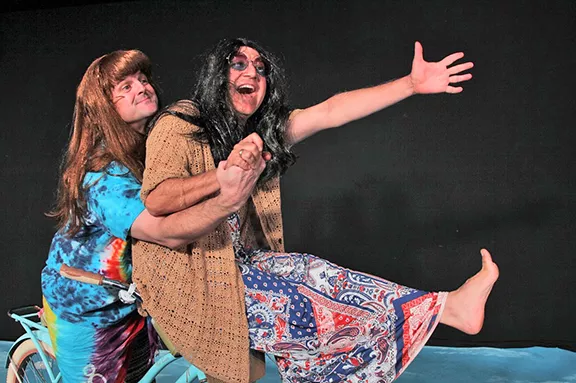Tuna is a town in Texas. It's also the subject of a series of plays created by Ed Howard, Joe Sears and Jaston Williams. The scripts are broad, satirical and funny-as-heck treatments of the citizenry of Tuna, the mythical town stuffed full of folks representing the best—or worst—of rural Texas small town life.
To provide some seriously lightweight fare for our heat-heavy summers, Live Theatre Workshop brings us "Red, White and Tuna," the third in the series of four shows (so far, and frankly, let's hope there's not a fifth). The first, Greater Tuna, was fresh and funny, really funny, as we met 20 Tuna denizens, male and female, in their outlandish impersonations, which were originated by Sears and Williams themselves when the show premiered on the scene in 1981. A few years later "A Tuna Christmas" again brought us some good laughs at Tuna town antics as the population dealt with holiday stresses and joys.
However, in this Tuna summer extravaganza, even though the jokes and characters steeped in stereotypes are certainly good for a few laughs, they are stretched as thin as seriously flattened roadkill.
When things first got rolling for the Tuna canon, one of the greatest treats for audiences was the seconds-quick costume changes that helped define the 20 characters the two actors portrayed. We get a hint of that here, but the quick changes are a little less quick, causing the antics to stutter a bit more than is wise. You really need to keep things rolling, because you don't want the audience to have time to think about whether or not things should be making some sort of sense, and if it matters or not that they should.
In the earlier shows, the action was anchored by scenes of the broadcasts of radio station O-KKK and the reporting of local news, often with editorial commentary, by the two anchors. Here, the writersdump that convention almost totally and try to spin a sort of plot. Or two. Or three. This approach scatters pieces of stories all over the place, and ultimately those pieces start crashing into each other, creating a big ol' Texas-sized mess. Consequently, even with the excellent efforts of actors Stephen Frankenfield and Keith Wick, who play all the characters, the intertwined stories become so diluted that none of them have much to offer, and we become weary of trying to make them fit together. Please, we want to say to the writers, just give us these outrageous characters in funny bits and leave the plot-making to those aspiring to sturdier fare.
For fans of the Tuna shows (and the fans are understandably numerous), there are plenty of sightings of those characters we have come to know and love in all their redneck glory. There's Bertha Bumiller and her twins Charlene, currently knocked up by her out-of-town military husband, and Stanley, the former reform-school bad boy who has found a respectable niche in the world of art in Santa Fe with his spray-paint taxidermy. There's Petey Fisk, the soft-hearted advocate for all animals, including scorpions and a strange cat that was fostered by a dog and now demonstrates some unpleasant characteristics of both species. There's Didi Snavely, proprietress of Didi's Used Weapons. (If Didi's can't kill it, it's immortal.) There's a very snooty Vera Carp, who thinks she's above everybody and is chairman of the Smut Snatchers, a group that reads books with an eye on their purity of story and language to determine if they are suitable reading for Tuna's citizens. (One such banned book was Lonesome Dove.) And of course there's Pearl Burass, Berta's mama, a senior citizen with gumption galore, who possesses many handy skills, including the ability to hot-wire a car.
The several plot lines involve the pending marriage of Bertha and Arles Struvie, one of the radio anchors, which is threatened by a difference in choices for their honeymoon. He wants to go to a rattlesnake round-up, and she wants to go to Eureka Springs in Arkansas to see the passion play. It's Independence Day, and there are plenty of fireworks in this uber-conservative town, including a hostage situation involving the Free White Texas crew, and the big Tuna High School reunion that apparently is to celebrate all those who ever attended the school and not just one year's class. There's all kinds of angst around this huge happening, including a scandal about who's to be crowned the Reunion Queen, and spoiled potato salad that causes reunion-goers all manner of misery. This is a lot of really inconsequential action to keep track of, and we find ourselves wanting to remind the writers that sometimes, less is more.
Frankenfield and Wick embrace their various characters (and their costume changes) with gusto, although each brings a different style to their character construction. Frankenfield relies on a broader approach so that it seems he acts "as if" he is a given character. Wick, on the other hand, goes for finding a more genuine take on his characters, and that results in humor arising from more relatable folks.
Director Jodi Ajanovic has wrangled her actors and their multiple characters well enough to ensure the mining of the multitude of possibilities for silliness, even though the production does seem overly long. Richard Gremel's set is fine, and although some of Stephanie Frankenfield's costumes work better than others, they do assist in helping define the characters for us. And congrats to the backstage efforts in seeing that the costume changes happen quickly and seamlessly. In this show that is no easy challenge.
This Tuna rather painfully reveals more than a bit of wear on the original concept. But if you can overlook how it dives into a more complex but unhappily convoluted script, there is satire and silliness enough to entertain a-plenty.







